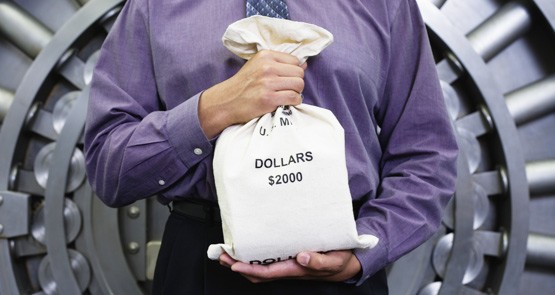
Hey, the sky stopped falling! Don’t you just love ABC News 24 at 8am leading its news bulletin with a “free fall” in global markets and then mentioning the late rebound on Wall Street as an afterthought; the real story was the late surge back in the Dow, Nasdaq and S&P 500 (and on the ASX 200 futures market, which fell more than 70 points at one stage, then rebounded to end up around 30 points). The Dow swung through a near 1000-point range on the day. And the Aussie dollar recovered as well. Oil prices continued falling (but ABC News 24 still couldn’t see the immediate impact of weaker oil prices is on investment and jobs), Shell confirmed it will cut 10,000 jobs once it completes the BG takeover, and the Malaysian oil and gas giant Petronas revealed cuts of US$11 billion from its four-year investment plan and will force the country’s government to either cut spending or increase borrowings. Shell also warned that its fourth-quarter profit would be around 50% lower than a year earlier (analysts are watching to see if it holds or cuts its dividend). Earlier this week Total warned of a profit fall of at least 20%. By 9am, News 24 had the right proportions in its reporting of what happened overnight, especially in the US. Lot’s of turmoil, but not much known about why oil is still sliding. — Glenn Dyer
What US rate rise? A month ago the US Federal Reserve grasped the nettle and shoved up its key interest rate for the first time since 2006 — it was a long-tipped and much-demanded decision, and the central bank released its usual forecasts, which suggested another four rate rises in 2016 to bring the rate up around 1.5%. In the past four weeks a lot has happened in the markets — actually a lot has fallen, very sharply. After hanging onto the four rate rise idea, futures markets in the US have abandoned it and markets now believe there may be only one, if any. And there’s the odd sceptic who reckon the Fed could retrace to the 0% to 0.25% (but that is very wishful thinking). Here in Australia, Citigroup and some other galahs reckon the RBA will be cutting rates once, perhaps twice this year — but many of the same analysts forecast rate cuts late last year (after the two in February and May), and nothing happened. The big sell-off in markets, especially oil and other commodities, are forcing a lot of changes on 2016 forecasts. — Glenn Dyer
BHP narrows its future. Given the sell-off in commodities, it is no surprise that BHP Billiton has long had a policy of investing on what it calls top-tier assets for its various businesses, such as iron ore, oil and gas, coal and copper. Its a form of protection in times like this. But no longer? It’s why it spun off some of its lower-ranked assets last year in a company called South32. But yesterday the company raised questions about the future of some of those top-tier assets. In comments in its half-year production report, CEO Andrew McKenzie said:
“Commodity prices fell substantially in the first half of the 2016 financial year putting pressure on the whole resources sector. We continue to cut costs and remain focused on safely improving our operational performance to enhance the resilience of our business.”
“In this environment, we are also committed to protecting our strong balance sheet so we have the financial flexibility to manage further volatility and take advantage of the expected recovery in copper and oil over the medium term.”
Most analysts took that comment to mean the company is heading towards a big change in its dividend policy, abandoning the commitment to maintaining or raising dividend and perhaps cutting it to allow it to make some targeted asset buys in the next year or so. But they missed the final part of the second statement: “take advantage of the expected recovery in copper and oil over the medium term”. No mention of any expected recovery in iron ore (BHP’s single biggest area of investment) and coal (coking and thermal and the third major area of investment). In fact, BHP appears to be ruling out any idea of a future recovery in iron ore and coal. That has importance for a number of projects, such as the controversial thermal coal project on the Liverpool Plains of NSW and expansion of its coking coal mines in Queensland. So expect BHP to buy major oil and gas assets (not shale) in the next year, probably in the US and a major copper mine, probably in South America. — Glenn Dyer







“It’s why it spun off some of its lower-ranked assets last year in a company called South32.”
Does that mean that there were no buyers?
Bottom-ranked assets?
So, has anyone at BHP thought that with the resources sector either in the toilet or well down the gurgler, that if you are a resources company, this would actually be a time to BUY, rather than sell assets?
Or are they going to wait until there is another boom in a commodity so that they can then pay way over the market price at the top of the boom so that they can then write down billions of dollars in assets?
That’s what every resource (and banking, and lots of other) companies have done for the last few decades.
I wonder when they will work out what their errors are?
Dogs breakfast, perhaps you should spend more effort on worrying about what’s likely to occur when cheap non-renewable resources become even more scarce?